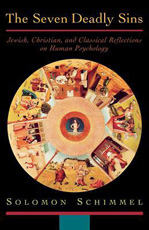"Of all the emotions, anger is one of the most common and most powerful. It assumes various forms designated by terms such as fury, wrath, ire, rage, resentment, vengeance, and indignation. Hardly a day goes by without most of us experiencing some measure of anger — either our own or that of someone with whom we interact, often a family member. The news regularly reports acts of violence unleashed by long-festering anger, a hidden desire for revenge, or a sudden, impetuous fit of rage. Anger plays a central role in assault, child abuse, murder and many rapes, and in interethnic and international violent conflict. Of the seven deadly sins, anger is the most pervasive, injurious to self and others, and most responsible for unhappiness and psychopathological behavior. It is also inextricably linked to the other cardinal sins, particularly pride and envy, as well as to hatred, and it is regularly aroused by frustrated greed and lust. As a psychotherapist I spend more time helping clients deal with their anger than with any other emotion. . . .
We [in the United States] live in a very angry society, with the highest rate of violent crime in the West. Our courts are clogged with the litigation of angry spouses embroiled in disputes over divorce and custody rights, and claimants bitterly suing each other for pain and injury. We have lost the ability to solve differences calmly and amicably. Why are we so angry? Perhaps it is because our culture espouses pride, standing up for one's rights, and combative competitiveness. Although we know that thousands of murders are committed by enraged people, we tolerate such behavior, lacking the national will to ban the weapons of their wrath. We enjoy violent sports and support violent media entertainment. Were our society to denigrate anger and the use of force, and encourage compromise, forgiveness, and stoic resignation, it would have a much lower incidence of anger and assault.
